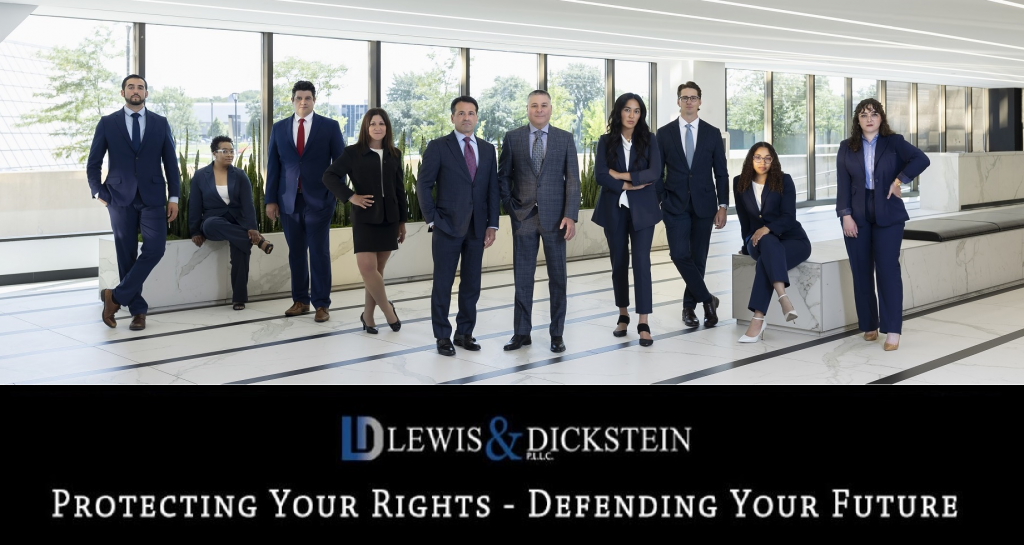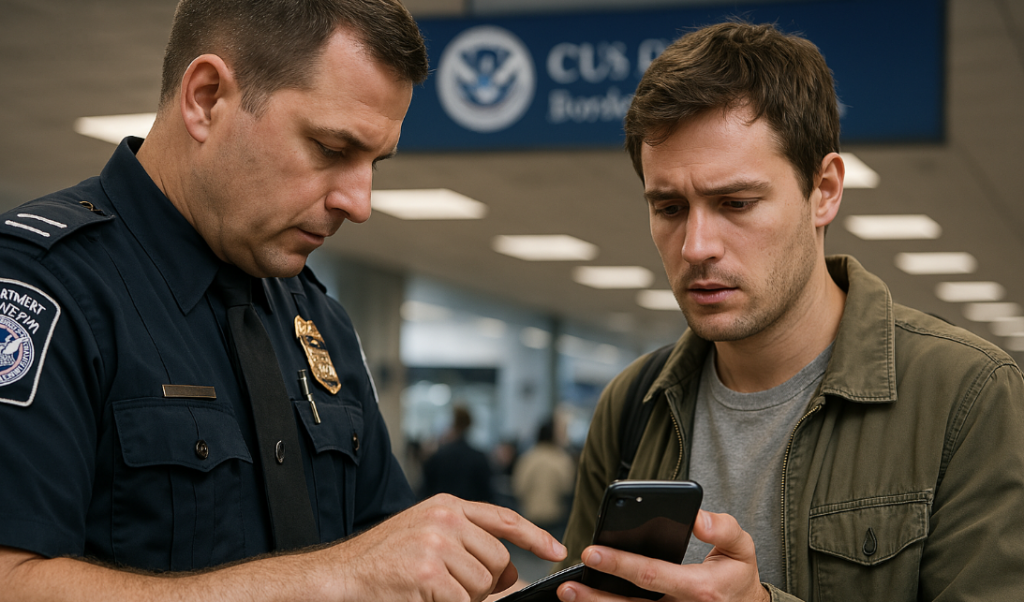Cell Phone Searches at the Border: What You Need to Know
U.S. Customs and Border Patrol agents demand cell phone passwords at an alarming rate. Can you refuse? What if they take your phone? What should you do?

Attorneys Experienced with Cell Phone Searches at the Border
Travelers entering or leaving Michigan often ask whether U.S. Customs and Border Protection (CBP) can search or seize their cell phones or laptops. The short answer is yes. Border agents have broad authority, and this blog explains what you need to know if you cross into or out of the U.S. through Detroit, Port Huron, or an international airport.
All travelers—including U.S. citizens, permanent residents, visa holders, and tourists—face the risk of CBP inspecting their electronic devices. If you live in Michigan or travel through the state, you need to understand your rights and the risks. This blog offers practical advice, real examples, and guidance for what to do if CBP searches your device.
CBP Authority to Search Electronic Devices
CBP can search electronic devices like phones, tablets, and laptops at the border without a warrant. The Fourth Amendment generally protects against warrantless searches, but courts allow an exception at the border. This “border search exception” permits CBP to inspect belongings and devices without probable cause or a judge’s approval.
CBP policy divides these searches into basic and advanced categories. In a basic search, an officer scrolls through your phone manually. In an advanced search, the officer uses forensic tools to access deleted data, hidden files, and other information. Supervisors must approve advanced searches, and CBP claims they only conduct them when they suspect unlawful activity or national security concerns.
CBP says they cannot search cloud-based data, so they should disable wireless connections or ask the traveler to place devices in airplane mode. That means they should only examine what you stored on the physical device, not your cloud email or social media accounts.

How Citizenship or Immigration Status Affects Your Rights
CBP treats travelers differently depending on their legal status. If you are a U.S. citizen, CBP cannot deny you entry for refusing to unlock your device or give them a password. However, they may hold you for hours or take your phone and return it later.
If you are a lawful permanent resident (green card holder), you have the right to enter the country and keep your green card unless an immigration judge orders otherwise. Still, CBP may delay your entry or seize your device.
If you are a visa holder or tourist from a visa waiver country, you face greater risk. CBP may deny you entry if you refuse to unlock your phone or cooperate during a search. Non-citizens should weigh the consequences before deciding not to comply.
Basic vs. Advanced Searches
A basic search involves an officer hand-searching your device. They may check your contacts, photos, messages, call logs, and app data. Most CBP searches fall into this category.
An advanced search uses special equipment to extract data for a forensic analysis. CBP might download and analyze all the contents of your phone. These searches can uncover deleted information or hidden files. Officers need reasonable suspicion and supervisor approval to conduct an advanced search.
Your Rights and Limitations at the Border
Your rights at the border differ from those you hold within the U.S. Here is what you need to know:
- CBP does not need a search warrant or probable cause to inspect your devices.
- You may tell the officer you do not consent to a search, but they will probably proceed anyway.
- You have no right to an attorney during a border inspection. If CBP detains or arrests you after the inspection, you may then request legal representation for representation on a criminal charge related to a border.
- If your device contains attorney-client privileged data, inform the officer. CBP policy requires them to take special precautions, but they may still access and review the data.

What To Do If CBP Searches or Seizes Your Phone at the Border
If U.S. Customs and Border Protection seizes your phone, do not do anything to make matters worse. If you physically resist the agents, you might face federal or state criminal charges for obstruction of justice or resisting a law enforcement officer.
- Remain calm and respectful. Arguing or becoming aggressive makes things worse.
- Do not block or interfere with the search. You may unlock the device yourself rather than hand over your password. If you refuse, expect the customs agents to take the device and try to unlock it using their tools. You are NOT required to provide your password.
If CBP takes your phone:
- Ask for a custody receipt listing your device and providing follow-up contact information.
- After the incident, write down everything you remember: officer names, badge numbers, times, and what happened.
- Change any passwords you provided to CBP.
- Monitor your email, cloud accounts, and social media for unusual activity.
- If your phone does not return within the expected time, contact the number on the receipt.
- If needed, contact an experienced criminal defense attorney who is familiar with cell phone searches at the border.
CBP policy says they will destroy any copied data within 21 days if they find no evidence of wrongdoing. However, they may retain notes or summaries of what they reviewed.
Steps To Protect Your Device Before You Travel
Taking precautions before crossing the border can reduce your exposure and help preserve your privacy. Here’s what you can do:
- Limit your data usage and the number of devices you carry. If possible, consider using a travel-only phone or laptop.
- Back up and delete private or sensitive files from your devices. Do not assume deletion makes the files unrecoverable unless you securely erase them.
- Use strong encryption and a secure password or PIN.
- Disable biometric unlocking features such as fingerprint or facial recognition.
- Power off the device entirely when approaching the border.
- Put your phone or tablet in airplane mode to prevent syncing or pulling in cloud data during a search.
- Sign out of apps that access sensitive content, such as email, messaging, and cloud storage.
- Remove saved passwords and logins from apps and browsers.
- If you must carry protected information (like attorney-client material), label it clearly and notify CBP agents when asked to inspect the device.
These steps do not guarantee privacy, but they make unauthorized access more difficult and reduce the likelihood of unnecessary exposure.

When To Contact a Defense Attorney
When should you contact an experienced criminal defense attorney regarding a cell phone search or seizure at the border?
- If CBP seized your device and did not return it within a reasonable time, or if you are under investigation, speak with an attorney.
- If CBP denies you entry or cancels your visa, a lawyer can help resolve the situation or advise on reapplying.
- If CBP officers repeatedly stop and search you, a lawyer can help determine whether they violated your rights.
- If you plan to travel and carry sensitive material, you may want legal advice beforehand.
Frequently Asked Questions
Can CBP search my phone without reason? Yes. CBP does not need a warrant or suspicion to conduct a basic search at the border.
Do I have to give my password? No. You can refuse. If you do, CBP may take your device and try to unlock it without your help. If you are not a U.S. citizen, they may deny you entry.
Will I get my phone back? Usually, yes. If CBP takes your device, they normally return it within 5 to 15 days. You should get a receipt. If they copy data, they are supposed to delete it within 21 days if they find nothing illegal.
Can I walk away if I refuse a search? No. Once you present yourself for inspection, you cannot leave. Agents must admit citizens, but CBP may delay them. They may deny non-citizens entry into the United States of America.
Do I have the right to a lawyer during an inspection? No. You only gain that right after CBP formally detains or arrests you.

Aggressive Michigan Criminal Defense Attorneys for Border Crimes
If you have a phone or laptop searched or seized, or you expect to cross the Michigan border and want to protect yourself, contact our team. A cell phone search border criminal defense attorney at LEWIS & DICKSTEIN, P.L.L.C. can advise you or help protect your rights. U.S. Customs and Border Patrol agents are intimidating and are trained to coerce people into giving up their private information. Unnecessarily providing your personal property or passwords can lead to misunderstandings, false allegations, and sometimes criminal charges. Do not be complicit in your own prosecution! Call us today for a free consultation. If you hire our team, we will take the time to talk with you, answer your questions, and work with you to develop a winning strategy.
Call us today at (248) 263-6800 for a free consultation or complete an online Request for Assistance Form. We will contact you promptly and find a way to help you.














